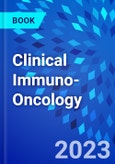-
Offers balanced and synthesized content on clinical science, clinical and translational research, and evidence-based practice for cutting-edge immunotherapies.�
-
Discusses clinical applications of immunotherapies in common types of cancer including melanoma, breast cancer, pancreatic cancer, colon and rectum cancer, prostate cancer, leukemias, and hematologic malignancies.�
-
Includes dedicated chapters on immune responses, innate immunity, active immunization against cancer, and cell-based therapies by leading experts.�
-
Covers key topics such as cancer immunotherapy in the presence of COVID-19, immunotherapeutics, new findings concerning the role of the microbiome in immunotherapy, advances in engineered cell-based therapies, and active immunization against cancer.�
-
An eBook version is included with purchase. The eBook allows you to access all of the text, figures and references, with the ability to search, customize your content, make notes and highlights, and have content read aloud.�
Table of Contents
?Tentative TOC:
Introduction:
Chapter 1.0 Development and Structure of the Lymphoid System
- embryologic development
- gross anatomy of the human immune system
- lymphatic endothelial cells, heterogeneity of, and lymph node microscopic structure
- lymph node function; afferent lymph cellular components
- role of the gut microbiome in immune system development
- specific functions related to the spread of cancer
- cancer-induced lymphangiogeneis; sentinel LNs
Chapter 2.0 The Chemistry, Structure, and Function of Immunoglobulins
- immunoglobulin isotypes
- the structure of immunoglobulins
- the genetics of immunoglobulin diversity
- antibody-dependent cellular cytotoxicity
- heavy-chain C domain and role of glycosylation
- the development of humanized monoclonals
Chapter 3.0 The Role of the Complement System in Cancer
- complement system activation pathways (classical, alternative and lectin)
- the role of complement activation in cancer progression
- complement regulatory proteins (CRPs) and cancer
- the role of compliment activation in the tumor microenvironment enhances tumor growth
- complement-dependent cytotoxicity in immune therapy of cancer
- formation of the membrane attack complex (MAC)
- potential application of anti-complement cancer therapies (C3aR/C5aR/IL-10 pathway)
Chapter 4.0 Cancer as Non-Self
4.1 primary generator of tumor-specific transplantation type antigens
4.2 character of non-self, tumor associated antigens
4.3 immune surveillance - innate immunity
4.4 distinguishing between self and non-self
4.5 toll-like receptors (TLRs); soluble bioactive proteins such as cytokines and C' proteins
4.6 NK cells
Chapter 5.0 The Adaptive Immune Response in Cancer
- the diversity of active tumor antigen receptors
- target specificity without limits in cancer-receptor variability
- tumor antigen presentation; dendritic cells
- immune response stimulation against the cancer
- Cytotoxic T-cells and T-regulatory cells
- B-cells and antibodies
Chapter 6.0 The Science of Innate Immunity
6.1 critical regulator of human inflammatory disease
6.2 anatomic and physiologic barriers to pathogens - cancer causing viruses
6.3 centrally a limited number of critical receptors
6.4 the character of the inflammatory response
6.5 lack of ability to form memory
6.5 role in activating subsequent adaptive immune response
Chapter 7.0 Immune Surveillance
7.1 history of concept (Ilya Mechnikov 1908 Nobel Prize)
7.2 evidence for immune surveillance today
7.3 cancer in the immunocompromised host
Chapter 8.0 Cancer - Avoiding Immune Detection
8.1 cancer and the presence of immune resistance
8.2 concept for the development of tumor cell tolerance
Chapter 9.0 Active Immunization Against Cancer and Cell-based Therapies
9.1 infusing in-vitro expanded Tumor Infiltrating Lymphocytes (TILs)
9.2 infusing dendritic cells pre-loaded with tumor specific oligopeptide antigens
9.3 B7 co-activating receptor
9.4 vaccines
Chapter 10.0 The Three Major Clinical Components of Cancer Immunotherapy
(modulating cell-mediated immune mechanisms)
10.1 the role of and application of check point blockade
10.2 the role and application of cell-based therapies including CAR-T cell therapies
10.3 antibodies (and vaccines); monoclonal antibodies and novel application of bi- or tri-specifics
Chapter 11.0 The Clinical Application of Immunotherapeutics
11.1 in melanoma cancer
11.2 in breast cancer
11.3 in pancreatic cancer
11.4 in colon and rectum cancer
11.5 in prostate cancer
11.6 in leukemias and hematologic malignancies
11.7 in other malignancies
Chapter 12.0 Cancer Immunotherapy in the Presence of COVID-19
12.1 immune response to coronavirus-2 infection
12.2 CD8+ T cell depression during chronic viral infection and cancer
12.3 checkpoint inhibitors in cancer patients with coronavirus infection
12.4 coronavirus depletion of CD4+ T cells








